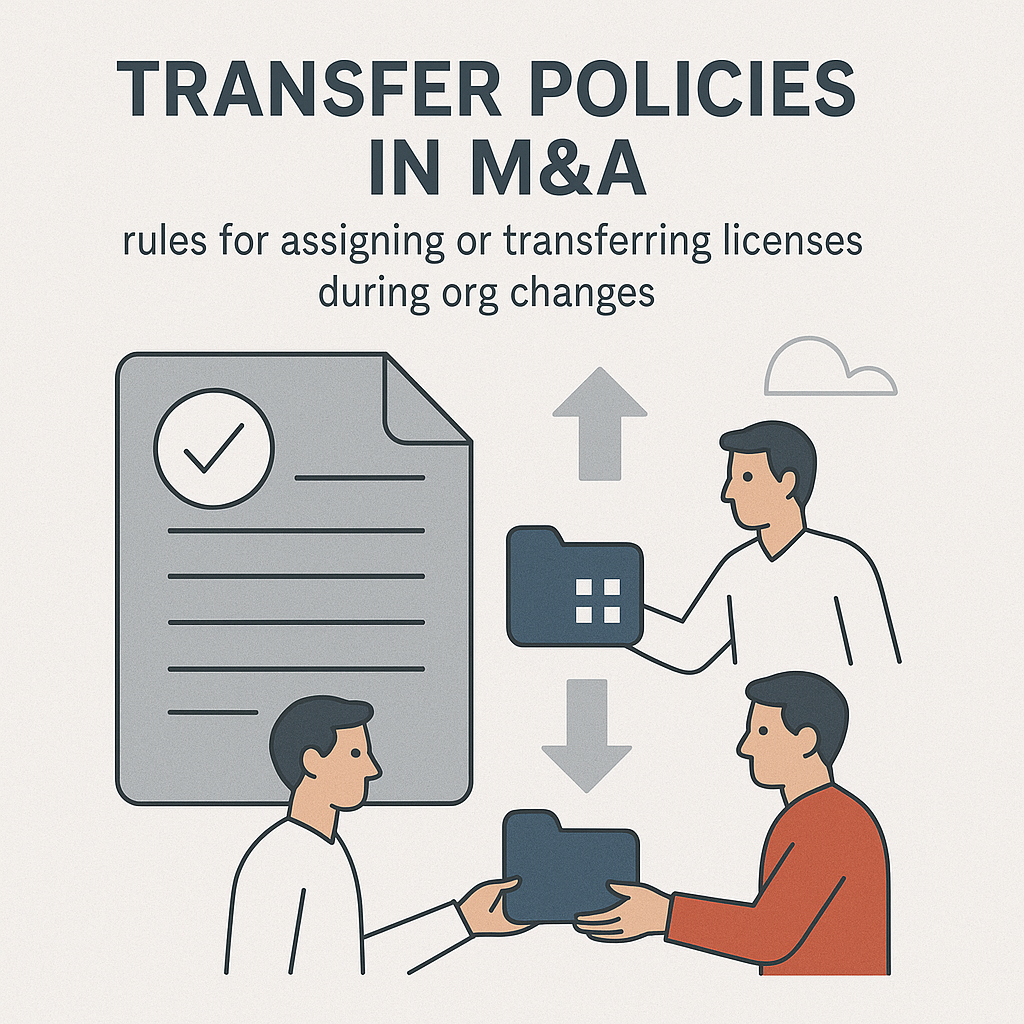
Oracle’s Transfer Policies in M&A
Oracle software licenses come with strict transfer rules that can catch CIOs off guard during mergers and acquisitions (M&A).
This article explains how Oracle’s licensing agreements handle organizational changes – when you can assign or transfer licenses, when you cannot – and what steps a CIO or CTO must take to stay compliant.
Understanding these policies helps technology leaders avoid costly licensing surprises when companies merge, split, or reorganize.
Non-Transferability and Assignment Clauses
Oracle’s standard agreements tie software usage rights to the specified customer (your company and its majority-owned subsidiaries). They prohibit transferring licenses to any other entity without Oracle’s prior consent, even in events like mergers or divestitures.
Even if your entire company is acquired, you must notify Oracle and obtain approval for the licenses to be carried over to the new owner. Partial transfers – for example, carving out some licenses to a spun-off business – are generally not allowed unless Oracle agrees.
Bottom line: never assume you can transfer Oracle licenses freely – always check your contracts and involve Oracle when structural changes happen.
License Transfers in Mergers
When your company acquires another or merges, the acquired business is not automatically covered by your Oracle licenses. You must work with Oracle to either add the new entity to your contract or transfer the acquired company’s Oracle licenses into your organization.
Until Oracle confirms those changes in writing, the safest approach is for each company to keep using its own Oracle licenses separately. Only once contracts are updated can the combined entity freely share or reallocate those licenses.
Read Avoiding M&A Compliance Pitfalls.
License Transfers in Divestitures
When you sell or spin off a business unit, that divested entity typically loses the right to use your Oracle licenses once it’s no longer majority-owned by you.
Oracle might allow a short transition period (e.g., 30–90 days) during which the new company can temporarily use Oracle software under your agreement. After that, the separated entity must stop using those licenses and obtain its own Oracle contracts.
Special Cases and Exceptions
Oracle might agree to a license transfer or contract novation in special cases, but this is entirely at Oracle’s discretion and usually comes with conditions. If Oracle grants a transfer, it will be formalized in writing (via an assignment letter or amendment), so be sure to obtain it in writing and keep a copy.
Be especially mindful of Unlimited License Agreements (ULAs). Many ULA contracts state that if a change of control occurs (such as your company being acquired or merged), the ULA terminates or requires immediate certification of usage.
In effect, your “unlimited” rights might not carry over after a merger unless Oracle allows it. Also, watch for any geographic or entity-specific license restrictions – if your new business structure goes beyond what the contract covers, you’ll need to update those terms with Oracle.
Compliance Risks of Unapproved Transfers
Ignoring Oracle’s transfer rules can lead to serious compliance problems:
- Audit Penalties: Oracle’s auditors can deem any unapproved usage as unlicensed, leading to back-dated license fees and financial penalties.
- Support Interruptions: Oracle may deny technical support to an entity that isn’t officially on the contract until licenses are properly assigned.
- Forced Purchases: The new organization might be forced to buy licenses for software it assumed was covered, often at high prices. Oracle often seizes such situations to upsell additional licenses or contracts.
- Legal Disputes: In worst-case scenarios, disagreements over unauthorized license use during M&A can escalate to lawsuits between your company and Oracle.
For CIOs and IT asset managers, the takeaway is clear: Oracle licensing must be a key part of any M&A plan. It’s far better to address transfers and obtain approvals upfront than to face an expensive compliance issue or audit surprise after the deal.
Recommendations
1. Review Contracts Early: Before any merger or acquisition, have your team review all Oracle license agreements for clauses on assignment or change of control. Understand exactly what is and isn’t allowed when your company’s structure changes.
2. Obtain Oracle’s Written Approval: If you need to transfer or reassign licenses due to an M&A transaction, engage with Oracle and request written consent. Make sure Oracle provides official documentation (an amendment or assignment letter) that adds the new entity or approves the license transfer.
3. Keep Environments Separate: Until licenses are formally transferred or contracts updated, keep the IT environments of the merging companies separate regarding Oracle software. Don’t deploy Oracle products across the new subsidiary or vice versa until you know it’s compliant to do so.
4. Use Transition Agreements for Spin-Offs: If divesting a business, use a Transition Services Agreement to define the duration during which the departing entity can continue to use your Oracle systems (e.g., 60 or 90 days). Communicate the cutoff – after this period, the new company must have its own licenses in place.
5. Factor License Costs into Deal Planning: Include Oracle license implications in your M&A planning and budget. If licenses can’t be transferred, anticipate the cost of new licenses or extra support fees and factor that into deal negotiations.
6. Evaluate Consolidating Contracts: Consider whether it makes sense to negotiate a new Oracle agreement for the combined entity after the merger. Oracle may propose an enterprise agreement or ULA to cover the whole company – assess these offers carefully and only agree if the value and terms align with your needs.
7. Document All Agreements: Maintain a clear paper trail of communications and agreements with Oracle regarding license transfers. Save emails, consent letters, and contract amendments. This documentation will be crucial if questions arise later or if Oracle audits the company.
Read about our Oracle Advisory Services.
